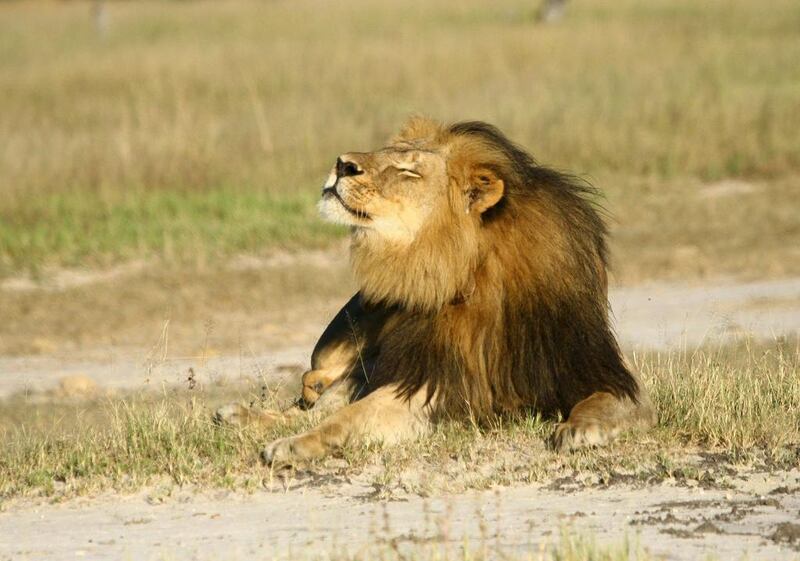Abu Dhabi International Hunting and Equestrian Exhibition is the region's go-to event for all things hunting and more. This annual event, which ran last week, prominently features archery, equestrianism and falconry and, in this regard, plays a role in promoting the UAE's heritage. Falconry has a long tradition among the Bedouin of Arabia, where hunting small prey with falcons was a means of supplementing a sometimes meagre diet. Archery and equestrianism too, have a rich regional heritage. Falconry is majestic, equestrianism is elegant, and archery is graceful. Some aspects of modern-day hunting, however, are just plain ugly, perhaps even pathological.
Trophy hunting (the recreational killing of wild animals) for example, widely elicits a societal gag reflex. In 2015, photographs of a dentist, who allegedly paid $50,000 for the pleasure of killing a lion named Cecil, went viral. The backlash was huge: social media pulled its collective "shame on you" face and vigorously wagged the global finger of public outrage for a few days.
_________________________
Read more from Justin Thomas
[ World Suicide Prevention Day: our attempts to prevent, hinge on our ability to predict ]
[ Mental health codes should evolve to keep pace with social shifts ]
[ Explaining the psychological challenges of population growth ]
_________________________
Even if you are relatively neutral on this topic, paying money to hunt and kill animals for fun begs the question why? Why would anyone want to kill an animal for fun; not for food, not a mercy cull, but just for the pure pleasure of ending a sentient creature’s life? There is relatively little psychological research into this type of behaviour, but when young children start torturing and killing animals, there is often talk of psychopathy.
In her article titled Why we may never understand the reasons people hunt animals as 'trophies', the forensic criminologist, Xanthe Mallett, argues that there is a clear link between intentionally hurting animals in childhood and violent crime in later life. Of course, not every child who enjoys pulling the legs off spiders and throwing cats at walls grows up to become a violent criminal or serial killer. However, perhaps there is something in this type of childhood behaviour that could help us better understand the predominantly adult male pastime of killing animals for sport.
A study published in the journal Anthrozoös in 2009 explored several factors that might help predict cruelty to animals. Among men, the two standout predictors were trait hostility and the need for power. Another study, published in Personality and Individual Differences in 2013, found that a cluster of personality traits, known as the dark triad (narcissism, Machiavellianism and psychopathy), were associated with animal cruelty.
It is, however, too simplistic to say that hunting, even trophy hunting, is synonymous with animal cruelty. People who trophy hunt, no doubt do so for a myriad of complex reasons. I'm sure there are even trophy hunters who do it simply because it's what their particular social circle expects of them. Such trophy hunters might not derive any pleasure at all from the practice. These are the dissonant hunters, those whose only pleasure is the social acceptance they receive for participating in the kill.
_________________________
Read more from Opinion
[ Brutally put, the Rohingya are pawns in a big power game ]
[ Editorial: Despite faults, the UN remains indispensable ]
[ The world cannot afford not to have a UN ]
_________________________
Judging by the photos of the smiling CEOs posing with the freshly shot corpses of big game animals, some trophy hunters undoubtedly derive pleasure from the pastime. Perhaps it's the exhilarating thrill of the chase. If this is the case, then why not use tranquilliser darts rather than live ammo? Those involved in game fishing typically operate a catch and release policy. If it is about the perceived sense of danger, then this is indeed misplaced, as you are far more likely to get injured playing football. Another joy of the hunt might be the sheer pleasure of being up close and personal with Mother Nature at her wildest. If this is the case, then why not just point and shoot a camera, rather than a semi-automatic firearm? It might also be that the desire to hunt and kill wild animals is a symbolic manifestation of a primal desire to assert our power over the rest of nature. If this is the case, then look around, we’ve “won”, already.
"How beautiful when man and nature live as one": this was the slogan of one of the central Adihex exhibitors and overall the event was characterised by strong conservation theme. Equine therapy, mindful archery, the healing power of the great outdoors, there is much at Adihex that is both healthy and health promoting. Trophy hunting, on the other hand, is, at the very best, questionable.
Unfortunately, to date, psychological researchers have not asked the question: why is the recreational killing of wild animals still a thing?
Dr Justin Thomas is an associate professor at Zayed University
Follow The National's Opinion section on Twitter
_________________________
Read more on Adihex
[ Camels sell for millions at Adihex auction in Abu Dhabi ]
[ Sheikh Hamdan bin Mohammed visits Adihex - in pictures ]
[ Perfumer to teach secrets of the old Gulf craft at Adihex ]
_________________________





